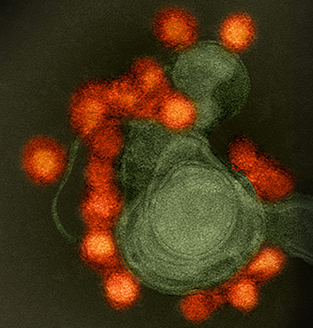
| Top stories | |||||||||||
| In the news | |||||||||||
| Photos | |||||||||||
| Contact us | |||||||||||
| Archive | |||||||||||
|
New Florida Zika cases prompt travel warnings |
The Florida Department of Health has identified two areas of Miami-Dade County where Zika is being spread by mosquitoes. CDC reported on Aug. 19 that – in addition to the previously identified area in the Wynwood neighborhood – there is now a mosquito-borne spread of Zika virus in a 20-block section of Miami Beach.

In its updated travel guidance, CDC asks pregnant women not to travel to these areas, and to take steps along with their partners to prevent mosquito bites. Additional recommendations include patient assessment, incubation periods and ways to prevent transmission.
Zika has been linked to microcephaly, characterized by a small head and underdeveloped brain, which may cause developmental delays, intellectual disability and other serious health conditions. It is transmitted primarily by Aedes aegypti mosquitos and possibly by Aedes albopictus, neither of which are native to Iowa.
All Zika cases in Iowa currently are travel-related. Weekly reports about these cases and other updates are available on the IDPH website.
Iowa health care providers wanting to test for Zika virus should contact Iowa Department of Public Health's Center for Acute Disease Epidemiology (CADE) at 800-362-2736. CADE staff will consult with the provider to determine if the case meets CDC testing criteria, and coordinate the collection and delivery of appropriate specimens to the State Hygienic Laboratory. For additional information visit: http://www.cdc.gov/zika/intheus/florida-update.html or http://emergency.cdc.gov/han/han00393.asp.
CDC Recommendations- Pregnant women should avoid travel to the designated area of Miami Beach (http://www.cdc.gov/zika/intheus/florida-update.html), in addition to the designated area of Wynwood, both located in Miami-Dade County, because active Zika virus transmission has been confirmed in both of these areas.
- Pregnant women and their partners living in or traveling to the designated areas should be aware of active Zika virus transmission and should follow steps to prevent mosquito bites (http://www.cdc.gov/zika/prevention/prevent-mosquito-bites.html). Health care providers caring for pregnant women and their partners should visit CDC Zika website (http://www.cdc.gov/zika/) frequently for the most up-to-date recommendations.
- Women and men who live in or who have traveled to the designated area of Miami Beach since July 14, 2016, should be aware of active Zika virus transmission. Those who have a pregnant sex partner should consistently and correctly use condoms or other barriers to prevent infection during sex or not have sex for the duration of the pregnancy. The same recommendation applies for women and men who live in or who have traveled to the designated area in Wynwood since June 15, 2016.
- Pregnant women and partners of pregnant women who are concerned about potential Zika virus exposure may also consider postponing nonessential travel to all parts of Miami-Dade County.
- All pregnant women in the United States should be assessed for possible Zika virus exposure and signs or symptoms consistent with Zika virus disease at each prenatal care visit. Women with ongoing risk of possible Zika virus exposure include those who live in or frequently travel to the designated areas of Miami Beach and Wynwood due to the possibility of active Zika virus transmission. Women with limited risk of Zika virus exposure include those who traveled to the designated areas of Miami Beach and Wynwood or had sex without using condoms or other barrier methods to prevent infection by a partner who lives in or traveled to the designated areas of Miami Beach and Wynwood. Each prenatal evaluation should include an assessment of signs and symptoms of Zika virus disease (acute onset of fever, rash, arthralgia, conjunctivitis), travel history, and sexual exposure to determine whether Zika virus testing is indicated. Limitations of laboratory tests used to diagnose Zika virus infection should also be discussed with pregnant women and their partners.
- Pregnant women with possible exposure to Zika virus and signs or symptoms consistent with Zika virus disease should be tested for Zika virus infection based on time of evaluation relative to symptom onset in accordance with CDC guidance (http://www.cdc.gov/mmwr/volumes/65/wr/mm6529e1.htm?s_cid=mm6529e1_e).
- Pregnant women with ongoing risk of possible Zika virus exposure and who do not report symptoms of Zika virus disease should be tested in the first and second trimesters of pregnancy in accordance with CDC guidance.
- Pregnant women with limited risk of possible Zika virus exposure and who do not report symptoms should consult with their health care providers to obtain testing for Zika virus infection based on the elapsed interval since their last possible exposure in accordance with CDC guidance.
- Women with Zika virus disease should wait at least eight weeks after symptom onset to attempt conception, and men with Zika virus disease should wait at least six months after symptom onset.
- Women and men with ongoing risk of possible Zika virus exposure who do not have signs or symptoms consistent with Zika virus disease and are considering pregnancy should consult their health care provider. Due to the ongoing risk of possible Zika virus exposure, health care providers should discuss its risks, emphasize ways to prevent infection, and provide information about safe and effective contraceptive methods. As part of their pregnancy planning and counseling with their health care providers, some women and their partners living in either of the two designated areas (Miami Beach and Wynwood) may consider if now is the right time to get pregnant due to the possibility of exposure to Zika virus during pregnancy or the periconceptional period.
- Women and men with limited risk of possible Zika virus exposure and who do not report signs or symptoms consistent with Zika virus disease should wait at least eight weeks after last possible exposure to attempt conception.